Nick Park Shaun the Sheep Interview
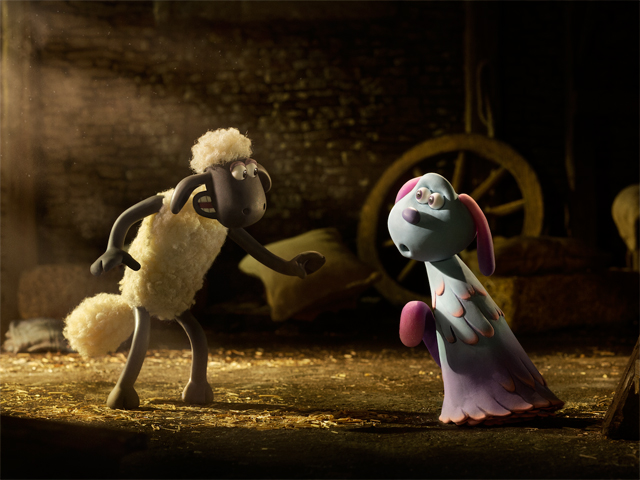
Join Shaun and Lu-La On Their Incredible Adventure
Rated: G
Running Time: 87 minutes
Synopsis: Strange lights over the quiet town of Mossingham herald the arrival of a mystery visitor from far across the galaxy… When the intergalactic visitor, an impish and adorable alien called Lu-La, crash-lands near Mossy Bottom Farm, Shaun soon sees an opportunity for alien-powered fun and adventure and sets off on a mission to shepherd Lu-La home.
Lu-La's magical alien powers, irrepressible mischief and galactic sized burps soon have the flock enchanted. Shaun takes his new extra-terrestrial friend on the road to Mossingham Forest to find her lost spaceship, unaware that a sinister alien-hunting agency is on their trail.
Can Shaun and the flock avert Farmageddon on Mossy Bottom Farm before it's too late? Join Shaun and Lu-La on their incredible adventure in A Shaun The Sheep Movie: Farmageddon.
A Shaun The Sheep Movie: Farmageddon
Release Date: 9th January, 2020
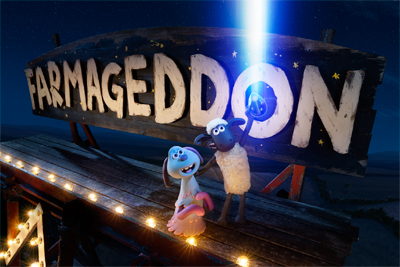 Shaun the Sheep's Creator
Shaun the Sheep's Creator
A household name for stop-motion magic, Nick Park discusses how his woolly partner in crime became a global icon (with a little help from Baby Spice) …
Nick Park is Britain's most decorated filmmaker – not that you'd tell from the manner of this gentle, soft-spoken 60-year-old. He has four Academy Awards® and five BAFTAs – including one for 1995's 'A Close Shave', the short that introduced an unsuspecting world to Shaun the Sheep. The imperilled sheep earned his name through being accidentally 'shorn' in that story – by the mechanised creation of Wallace, one of Park's other iconic characters. "It was quite spontaneous, for [co-writer] Bob Baker and myself," says Park of the day Shaun was born. "It was really just writing that scene, because you have to have a name for a character, for people to latch onto them, for people to relate to them. It was fairly instantaneous, because of the double meaning."
The cheeky but warm scamp went on to secure his own TV series and became another unlikely pop cultural hit for Park, although he is keen to emphasise the work of others at Aardman who developed the character. "For years I thought, 'He could have his own series. He could get up to all sorts. He is both cute and cool at the same time,'" says Park. "But I didn't have much more than that. Then Richard Starzak got hold of it and ran with that idea and really made it a lot more concrete. He really took that and expanded it and injected a humour I hadn't established with the original character. That's when it really took off." Now, after five series and on his second feature film, Shaun has achieved more than anyone could have imagined. And is showing no sign of slowing down anytime soon...
Question: You were busy directing Early Man when Farmageddon was in production – was your involvement on this essentially as a Yoda figure?
Nick Park: I guess that's one way to describe it! When I was doing Early Man, I kept passing people who were working on this. They were always drinking lots of coffee. I would hear things like, 'It's aliens and sheep.' I heard pitches of the story and was asked for my opinion. I feel very grateful and privileged to be involved.
Question: Shaun is 25 years old now. What was it about him, back in the day, that made you realise he was special?
Nick Park: You have an instinct, but at the same time it's kind of surprising when it does work! I enjoyed designing him, originally. I think it was his little woolly top and the shape of his face. It's dead simple, really. He was designed originally as this younger sheep, quite innocent – a victim, really. He needed rescuing but turned out to be quite heroic as well – busting them [Wallace and Gromit] out of prison, things like that. He also, because of his simple and striking design, sold really well as merchandise. He suddenly took off. I guess that's because people liked the character.
Question: Did his features inform his character, or the other way around?
Nick Park: It's hard to say which. It's a chicken and egg thing because I tend to sketch a lot while we're writing, so the ideas develop in tandem, really. The difficulty, because of how simple Shaun is, was how to get a human expression out of him. The animators are brilliant at using his eyebrows and mouth. We work with some of the best stop-motion animators in the world. It's when you get something meaningful out of something simple – that is really quite magical. And Shaun does that. It's funny. One idea often spawns the next, and you don't even know it at the time. When I sit back and look at the films, there are lots of those details,like pictures on the wall, and they often hold clues as to what the next idea is. For example, in A Grand Day Out [1989, six years before Shaun the Sheep ever existed], there's a picture on the wall of a sheep jumping over a fence. And in The Wrong Trousers, Wallace had a giant marrow in a glass case, in a sort of a taxidermy way. And the subject of The Curse Of The Were-rabbit [which was made 16 years after The Wrong Trousers, in 2005] was giant vegetables. They all, the seeds of one idea, start in a previous film. Because they are always going around, these things, in my head.
Question: Shaun has a huge appeal all over the world. Have you been amazed by how far he has travelled?
Nick Park: I am, actually. Both in a positive and a slightly disturbing way. When A Close Shave first happened, suddenly Shaun was out there and all the different merchandise happened. It was when the Spice Girls were big and Baby Spice was photographed with a Shaun the Sheep backpack and sales went through the roof. That was part of the big launch of Shaun, really. And I was actually watching a news item a couple of years ago, about Syria. There had been a bombing and people were being taken into makeshift hospitals… and there was a boy with a Shaun the Sheep T- shirt on. It was all very strangely real… An ironic mixture of feelings, really…
Question: Shaun is almost a silent movie star with a big heart – and he appeals across the ages. He's the perfect character for this divided world, right?
Nick Park: Yes, you're right. It is very timely, isn't it? This film is something that everyone, adults and children, can sit and watch and all laugh together. I think that is a great thing to have achieved. That's a great thing, to bring people together. There's nothing better than a laugh to let people forget their differences. What Shaun the Sheep is good at is sending up the way we are as humans. A lot of the premise of Shaun the Sheep is that a lot of what these characters are doing is behind the backs of humans, but we [as the audience] are privy to that. I think we relate to that. He is excitable and naughty. He's a flawed character, but in an innocent way. He's human, really. I think his basic flaw is that he doesn't like to do what he's told.
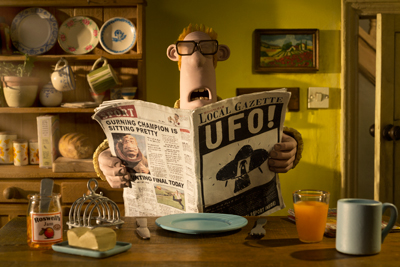 Question: Are you naturally a Shaun-type character, someone who doesn't like to be told what to do?
Question: Are you naturally a Shaun-type character, someone who doesn't like to be told what to do? Question: How did you start out on this career path?
Nick Park: I grew up on animated films and cartoons. I saw every Disney film at the cinema. I loved watching cartoons on TV. I suppose what really got me hooked was when I would see animation and I would think, 'Oh, I could do that.' It was things like Morph – that Pete [Peter Lord] and Dave [David Sproxton] had already started doing. I was a teenager then. Before that I used to watch Bob Godfrey animation, like Roobarb And Custard. That's probably the thing that really got me going, because that was all wobbly drawings and very accessible. I could see that it was drawings, done with a felt pen and the colours were all shimmering and it wasn't sophisticated and polished. But I loved the raw humour that came out of it. That really got me fired up about making my own films.
Question: How did that manifest itself?
Nick Park: Even as a young kid, I used to love drawing and making models. And I was always driven, ambitious, in a way. I saw a documentary about Walt Disney and saw how the whole thing started with a mouse, with him drawing a mouse. And I thought, 'I'd love to have my characters known out there, in the world. That would be my life's ambition.'
Question: It's amazing that you had such great focus as a kid…
Nick Park: I guess so. I used to have these characters that I would have high hopes for. I would draw them on badges and wear them at school. I got caught by a teacher once, who told me to take them off and told me it was childish to have those sorts of things.
Question: If only that teacher could see you now…
Nick Park: Well, yes, I guess!
Nick Park: I feel immensely proud and pleased to see where he has gone and what he has become. As a film star, a movie star, and beloved by people. The fame and the profile of our characters, it means all the more when you know they've earned that respect from people.
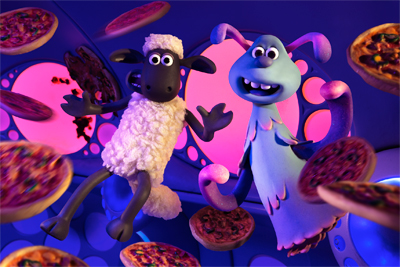 Shearing Shaun
Shearing Shaun
The man who cuts Shaun down to size, editor Sim Evan-Jones talks character, energy and stopping things ever getting sappy...
Ask literally anyone working on Farmageddon (trust us, we did) and they'll tell you that if there's one man crucial to its success, it's Sim Evan-Jones, Shaun's editor.
Editing is crucial to the pace, clarity and humour of all movies, of course. But on Aardman ones that is amplified "to an almost extraordinary extent," according to producer Paul Kewley. As Aardman co-founder, David Sproxton, explains of the particular challenges when it comes to editing in stopmotion, "We always go back to The Wrong Trousers [made in 1993, before Evan- Jones' arrival at the company], as the model for economy [when we're editing]. When you look at that film, even now, there's not a shot that you don't need in there. There's no redundant screen time. People forget that the rough-cut ran to almost 45 minutes, and it had to be a 30-minute film. So, we had to lose almost a third of what we'd shot! And we might have lost one or two shots, but we didn't lose any sequences. We basically trimmed, a lot. But it still had a lovely pace. And a lot of times, that is what we're trying to get back to."
With Farmageddon, an epic adventure featuring space travel, an alien, a sinister government agency and a quest for the perfect pizza, Evan-Jones has faced his most complex challenge to date – and the results are both seamless and brilliant. Having honed his craft in America at DreamWorks, where he cut the first two outings of their iconic green character, Shrek, Evan-Jones next enjoyed live-action outings to the land of Narnia, before he returned to England and sought out the best place to work in animation anywhere in the world – Aardman, in Bristol – to learn how to edit movies to be the very best they can be. It's fair to say the plan worked…
Question: You've cut live-action family films, like The Chronicles Of Narnia and Nanny McPhee, as well as animation – how does the energy on an Aardman movie compare?
Sim Evan-Jones: We are very aware of energy when it comes to Shaun, with there not being any dialogue. It's funny, at one point we were trying to develop a mantra. We came up with 'clarity' and 'comedy' but we could never think of the third 'c'... I guess kinetic energy works quite well! You know, there's always a sense that you need to keep things moving. You can't just chuck a line in if something is unclear. There's an energy that rolls forward. Narrative energy is a good way of describing it. You always need to keep the story moving.
Question: What's the key to that?
Sim Evan-Jones: The answer to that is to keep layering. On all these movies we've done, there are these sort of 'day in the life of' montages that we use in the beginning to get the story moving. To set up the stakes for Shaun. To precis and remind the audience of his world. To set up the story. Because of the genius of the Aardman approach, everything is done in a comedic way. Every little narrative development is another joke or another layer of comedy. The other brilliant thing that they always do – and it's house style – is that undercutting of comedy. Or even undercutting the emotion, which you have to be really careful with. They never get too sappy or too overwrought or dramatic. I think that possibly is a British thing. I think it is definitely something that Aardman has specialised in over the years.
Question: Has Shaun changed over the years?
Sim Evan-Jones: I don't know that he has. I think Shaun is a very clearly defined character and always has been. But in this movie, we definitely see new levels to Shaun. He is given responsibility. And we see how he deals with that. It starts off as organic and then themes start to emerge. Producers and directors focus on things that they want to promote and Shaun having a taste of his own medicine for once was definitely something they wanted to focus on. Inside of the, 'Yes, we are doing a Shaun the Sheep science fiction movie,' there had to be the question of, 'But what is this Shaun story?'
Question: How would you describe that story?
Sim Evan-Jones: It's Shaun having to take on responsibility and discovering what it's like to have to deal with someone who is like Shaun – his naughtiest sibling, basically. Because this new character we have – Lu-La – has emerged as this beautiful thing from a beautiful world, who is beautifully designed, by the way. It was decided that she would have certain otherworldly skills and party tricks. But until you put them into the plotting, you don't know how they're going to reveal themselves. Also, everything she does has to reflect that character and those attributes. She has to be consistent. If we're saying she is cheeky and a bit of a handful, she has to be that.
Question: Career-wise, you're in a real Aardman groove at the moment – you edited Early Man too and next you're doing Chicken Run 2. Why do you love working on these movies so much?
Sim Evan-Jones: There are a lot of reasons, really. I've got a very strong background in animation. And Aardman will always be one of the greats and are internationally renowned. I had always been really interested in the idea of coming here for a bit, and as luck would have it, I came in to work on the first Shaun [movie]. I was supposed to be here for four weeks... and that was about four years ago now. Because if you're pursuing animation, this is the absolute place you need to be.
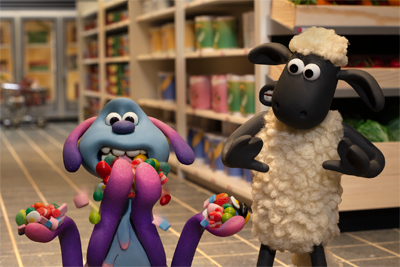 "Beyond imagination"
"Beyond imagination"
They met at school aged 12 and later formed Britain's most beloved animation studio. Peter Lord and David Sproxton talk their enduring partnership…
Bristol-based animation house Aardman has grown from a tiny, homemade operation in 1972 to a multi-award winning studio today, employing 100s of creatives and talent – all flowing from the dedication and inspiration of co-founders Peter Lord and David Sproxton.
They met in the 1960s, when Lord, having spent three years in Australia, returned to school in Surrey and the only seat in his new classroom was next to that of Sproxton. Gentle jibes about his accent gave way to a growing friendship and a shared passion: for storytelling. And animation in particular.
To begin with, they were both directors, working on commercials and shorts, but the business relationship and the company evolved as Lord started to work with Nick Park on Chicken Run, which would become the most successful stop-motion picture of all time. "Nick and Pete were working on the script and I said, 'Why don't you guys direct it and I'll help manage the rest of the company?'" recalls Sproxton, explaining the division of labour between them. "The key things are that our values are very similar, in terms of the company, in terms of what we want to try to do."
This included setting up the company as employee-owned last year, sharing the decision-making with the staff who make up the Aardman family. It's a testament to their loyalty and values – and a friendship that endures after 50 years. Says Lord, with a smile: "Neither of us would be here without the other."
Question: How are you feeling about Farmageddon now that it's nearly coming to release?
David Sproxton: It's always a mad scramble for the finish, but it's looking good. The big problem you have with all these movies is getting the story to land. You realise that there are little, knotty things that you have to solve. You often do with a live-action film too, because you want to get the maximum emotion out of it.
Peter Lord: It's the way it always feels: Elation that you've got there. Anticipation, of how the world is going to receive it. Exhaustion... And a faint sense of regret. Regret because it's over. When you work on a film like this, it's a very strong family, community event. You get a great team together and your job is to finish it. And when you get to the end, you go, 'Oh, I don't want it to finish now. I don't want that group to break up.' It's always the same. A bittersweet experience.
Question: It's funny you mention the word 'family' – that seems to be very much the Aardman ethos?
Peter Lord: Yeah, it is. We don't talk about it very much or think about it very much, but it's instinctive. It's the understanding that people should enjoy their work. That's as important as anything else. They should enjoy the process of coming to work, they should enjoy what they do. And we are a very specialised group, aren't we? We've evolved over the years to do something highly specialised, that we're very good at, so it does give you a sense of being in a family, a community, a club – all of those things.
Question: How do you look back on the evolution of the company? This is four decades we're talking about… Do you ever take a moment to reflect on how you got here?
Peter Lord: Yes, I mean, as the years pass you do get more chances to do that. Recently, I was given the honour of Fellow of Arts University Bournemouth and part of that process is somebody reciting your achievements. You get to hear it and you get to think about it more and more… It always feels to me like a series of evolutions. It's been steady for us. When I say steady, that doesn't mean it hasn't been rocky – because you expect that over 40 years! We have had difficult times, challenging times. But, generally, we've progressed steadily. That's our temperament. Objectively, if I throw myself back to 1976-or-something, what we've achieved really would have been beyond imagination. I don't think that's an exaggeration to say. We were just two blokes in a room, me and Dave, wondering where the next job was coming from. From there to our mighty empire, our moderately-sized mighty empire, would have seemed unimaginable. At that time, when we were young, there wasn't a British animation company that was 'on the scene'. There were a series of small companies that we were aware of but that was it. So, I feel fantastic. When I stop to think about it, I think, 'Yeah, that's pretty damn good.'
David Sproxton: It's been a hell of a ride. It was a series of stepping stones, in a way, that lead to a series of bigger and better things. Wallace & Gromit and the Oscars… When we started out in the late '70s we never thought we'd be making feature films, largely because there weren't very many actually being made. Then Warners came in, DreamWorks came in, CGI started to blossom, and everything took off. There is a natural organic nature to all of that. It's only when you look back that you think, 'Bloody hell, how did that happen?' And we're still learning.
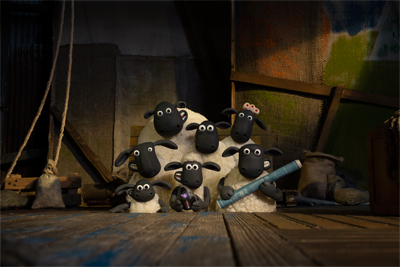 Question: The economy of your storytelling in Farmageddon is more impressive than ever. Do you feel like you're at a stage with these movies where you are the best that you can ever be at it?
Question: The economy of your storytelling in Farmageddon is more impressive than ever. Do you feel like you're at a stage with these movies where you are the best that you can ever be at it?
David Sproxton: To be honest, it's hard work. When you go into the animatic phase that's where the heavy lifting is done. Especially with Shaun, who is so visual, because we don't have dialogue to guide the narrative. You start to say, 'Do we need that establishing shot?' Because, really, what you want to have is a lot of time for fun and games. You don't want to have your screen time taken up with plot; you want to have it taken up with emotion and silliness.
Question: Is Farmageddon your most ambitious movie ever?
David Sproxton: We are literally taking Shaun and everyone into a different dimension and that was part of the gag. 'What happens if you take him to a different galaxy?' So, in that way, yes." Lord: "We chose to shoot it widescreen, scope, to kind of humorously recall movies shot in the American Midwest, because that was part of the joke. I'm not even sure – and don't tell anyone – where Shaun the Sheep lives, but it was amusing to take that setting and make it big and widescreen, with big open prairies, just so we could get a ton of references to classic sci-fi movies. Maybe that makes it feel bigger. I hope it does. It does all sorts of ambitious things. It uses a lot of VFX, which is normal for movies these days. But the stuff people care about is still little puppets that are barely more than five inches high.
Question: Is Shaun symbolic of the Aardman ethos? Very British, very cheeky, very full of heart?
Peter Lord: You're right! [Laughs] That's true, actually. Interesting. Obviously, everyone loves Wallace & Gromit. I love Wallace & Gromit. But there's a lovely everyman quality about Shaun. Mischievousness is very important to us, actually. And to Shaun. Mischievousness is close to anarchy, in a good way. Youthful rebellion, that's his modus operandi, isn't it? There he is, in a very small world. The world of Mossy Bottom farm is deliberately very small and domestic. The farmer, as far as he's concerned, he keeps his sheep in the barn – that's all he's aware of. So, they should have a very constrained worldview. But good old Shaun, he doesn't accept that. He is always pushing the boundaries. And always getting away with it. That's the joy of him. I like mischief. I like Aardman, as a company, to be mischievous when we can. When you get big, it's hard to remember that. But a sense of fun, a gentle sense of provocation, a sense of rebellion, to not take yourself too seriously. I think that's important, to both Shaun and to us.
Question: What do you feel about Shaun, after all these years?
David Sproxton: It's a little like Wallace & Gromit – what you're trying to do is see these characters grow up a little. This is a bit of a learning-to-grow-up story. That was sort of the start point. It was, 'Okay, so we have this alien story… But what does that mean?' You're working backwards, always trying to think what's next for the characters, what's next for the relationships? The other interesting thing about these films, unlike other feature films, is that they are a serial, so you've got to end up back at square one. I remember we had this extraordinary discussion with Jeffrey Katzenberg [when Aardman was in partnership with DreamWorks] when we were shooting The Curse Of The Were-Rabbit. He said, 'So, what does Wallace learn?' And we all looked at each other and said, 'Well, no, Wallace never learns. That's the point! You go back to the beginning…' And he said, 'Oh, okay, I see…' It was a different format than he had been exposed to, as opposed to, 'Something happens, the character learns something and moves on a bit.'
Question: Making Shaun the 'responsible one' is a clever touch on this, for the fans who have grown up with him and who now have younger siblings. Was that deliberate?
Peter Lord: We were certainly aware of that. You need to find accessible things, for a young audience. That doesn't mean showing them their own lives, necessarily. I think we take the view that there are certain experiences that are fairly common to most people, and certainly one of those is having a younger sibling, or a younger friend, coming along and sort of taking some of the limelight, the spotlight. The experience of being obliged to take responsibility. That idea of, 'Look after your brother for a minute…' The thing we worked hardest on, probably – the big debate – was, 'How much is Shaun taking responsibility?' Initially he has no desire whatsoever to take responsibility, to be a caring fellow. He just sees it as being great fun! An enormous potential for fun. It's a selfish choice, initially. And then, only as the story progresses, does he realise, 'Oh, crikey, this is really serious,' and he has to take responsibility. And then there's the fundamentally comic idea of the guy who has always been the mischievous one, now getting a taste of his own medicine.
Question: Aardman went employee-owned last year – what can you tell us about that decision?
David Sproxton: We are preparing for our future. The creation of an employee trust is the best solution we have found for keeping Aardman doing what it does best, keeping the teams in place and providing continuity for our highly creative culture. And of course, those that create value in the company will continue to benefit directly from the value they create"
The statistics show that employee owned companies are significantly more successful than conventionally owned companies. So we are very excited by the prospect of seeing Aardman roll far into the future under this arrangement and can rest easy that those four decades which have slipped by have paved the way for many more years of great creativity.
Question: Aardman has a spirit – and a humour – inherent to it. But the movie industry as a whole takes itself quite seriously. Has that been hard over the years?
Peter Lord: Yeah, it has. [Laughs] It's a very interesting thing. British comedy in America has always been a mysterious thing. A few things cut through and work really well, and it's really hard to predict what. I think we've done incredibly well in that world, to make such an impact. We very consciously set out to not take ourselves too seriously, because I was aware that Hollywood movies for children often contained a very, very strong moral message. It's become part of the package now. It's what people positively expect now. That's okay… But we're pretty subtle with that moral message! I like to think that in what we do, the most important thing is that goodness wins out. Goodness, optimism, humanity wins out, and cynicism and calculation and evil doesn't.I mean goodness in the most profound sense. Shaun is profoundly good. That doesn't mean that he isn't mischievous, that doesn't mean he doesn't cause trouble. Ultimately, though, what he stands for is good and decent. But you don't have to labour that point. I think our stuff is fundamentally moral. I know that with the first [Shaun] movie, and I hope so with this, that people came out smiling. Smiling. Because they've seen something that was funny and warm and life-affirming, and that's always what we hope for from our films.
A Shaun The Sheep Movie: Farmageddon
Release Date: 9th January, 2020
MORE



